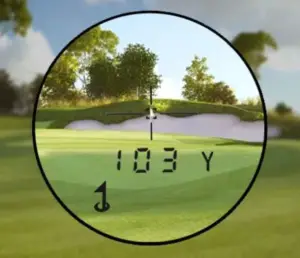What To Look For In A Golf Rangefinder

Are you a passionate golfer looking to improve your game? If so, you’ve likely come across the term “golf rangefinder” in your quest for better accuracy and distance measurement on the course. A golf rangefinder is a powerful tool that can help you precisely determine the distance to your target, allowing you to make more informed club selections and improve your overall performance. However, with a wide array of options available in the market, choosing the right golf rangefinder can be a daunting task. That’s where we come in.
In this comprehensive guide, we will walk you through everything you need to know about what to look for in a golf rangefinder. Whether you’re a seasoned golfer or just starting out, understanding the essential features and attributes of a rangefinder is crucial to making an informed decision. From accuracy and precision to distance measurement capabilities, ease of use, display features, battery life, and durability, we will cover it all.
Get ready to elevate your golfing experience as we dive into the world of golf rangefinders and equip you with the knowledge to choose the perfect one for your needs. Say goodbye to guesswork and hello to more accurate shots as we explore the factors that make a golf rangefinder an invaluable companion on the course. Let’s get started on your journey to better accuracy and a more satisfying golf game.

Understanding the Types of Golf Rangefinders
When it comes to golf rangefinders, there are primarily two types to consider: laser rangefinders and GPS rangefinders. Each type has its own set of features and benefits.
Laser Rangefinders
Laser rangefinders utilize laser technology to precisely measure distances. They are popular among golfers due to their accuracy and versatility. Laser rangefinders are capable of measuring distances to specific targets, such as flags or hazards, with great precision.
Some key attributes to consider in laser rangefinders include:
- Pin-seeking technology: This feature helps you target flags and hazards more easily, making it simpler to determine accurate distances.
- Magnification capabilities: With magnification, you can get a closer look at your target, ensuring better visibility and accuracy in distance measurements.
GPS Rangefinders
GPS rangefinders utilize satellite technology to provide distance calculations. They use preloaded course maps to offer comprehensive information about the layout of the golf course.
Key attributes to consider in GPS rangefinders include:
- Preloaded course maps: These maps allow you to easily navigate the course and provide valuable insights into the layout, including hazards, bunkers, and greens.
- Hazard and green mapping: GPS rangefinders often include features that enable you to accurately measure distances to hazards and layup points, helping you strategize your shots effectively.
Now that we’ve explored the different types of golf rangefinders, let’s dive deeper into the essential attributes to consider when selecting one.
Assessing the Accuracy and Precision of a Golf Rangefinder
Accuracy and precision are crucial factors to consider when choosing a golf rangefinder. After all, you rely on the device to provide accurate distance measurements to improve your game. Here are some aspects to evaluate:
- Yardage accuracy: Look for a rangefinder with a small margin of error to ensure precise distance calculations.
- Target acquisition speed: A rangefinder that quickly locks onto targets and provides measurements in a timely manner will enhance your efficiency on the course.
- Slope measurement capabilities: Some advanced rangefinders offer slope adjustment, allowing you to factor in elevation changes for more accurate club selection.
Evaluating the Distance Measurement Capabilities
The distance measurement capabilities of a golf rangefinder are crucial for understanding your targets and making informed club choices. Consider the following attributes:
- Maximum range: Look for a rangefinder with a long maximum range to ensure it can measure distances even on larger golf courses.
- Scan mode: This feature enables you to obtain continuous measurements of multiple targets, helping you gauge various distances on the course.
- Distance calculation to hazards and layup points: A rangefinder that provides accurate distances to hazards and layup points will aid in course management and shot strategy.
With accuracy and distance measurement covered, let’s move on to evaluating the ease of use and display features of a golf rangefinder.
Considering Ease of Use and Display Features
When using a golf rangefinder, ease of use and display clarity play a crucial role in your overall experience. Consider the following attributes:
- Ergonomics and design: Look for a rangefinder that offers a comfortable grip and intuitive controls. You want a device that feels natural and easy to handle during your rounds.
- Display clarity: Opt for a rangefinder with a clear and easy-to-read display. You should be able to quickly and accurately read the measurements without any confusion.
- Brightness and visibility: Ensure that the display is bright enough to be easily visible in different lighting conditions, including bright sunlight.
- Adjustable focus: Some rangefinders allow you to adjust the focus to suit your eyesight, ensuring a sharp and clear view of the target and measurement data.
Now that we’ve covered ease of use and display features, let’s explore the battery life and durability of a golf rangefinder.
Battery Life and Durability of a Golf Rangefinder
Battery life and durability are important considerations, as you want a rangefinder that will last through multiple rounds and withstand the rigors of the golf course. Pay attention to the following attributes:
- Battery type and longevity: Consider a rangefinder with a long-lasting battery that can handle extended use. It’s also helpful to choose a device with easily replaceable batteries or a rechargeable option.
- Weather resistance: Look for a rangefinder that is weather-resistant, capable of handling moisture and dust encountered during outdoor use.
- Construction quality: Durability is key, so choose a rangefinder made from high-quality materials that can withstand the occasional bumps and drops it may experience on the course.
As you evaluate the battery life and durability, remember to consider any additional features and take into account your specific preferences and budget.
Additional Features and Considerations
Beyond the essential attributes, there are additional features and factors to consider when choosing a golf rangefinder. These include:
- Size and weight: Portability is important, so choose a rangefinder that is lightweight and easy to carry during your rounds.
- Price range: Determine your budget and explore rangefinder options within that range, considering the features and performance that align with your needs.
- Brand reputation and customer reviews: Research reputable brands and read customer reviews to gain insights into the reliability and user satisfaction of various rangefinders.
By considering these additional features and factors, you can further narrow down your options and find the perfect golf rangefinder for your game.
In conclusion, a golf rangefinder can be a game-changing tool to enhance your accuracy and distance measurement on the course. By understanding the different types, evaluating accuracy and distance measurement capabilities, considering ease of use and display features, and assessing battery life and durability, you’ll be well-equipped to make an informed decision. Remember to explore additional features, align your choice with your preferences and budget, and research reputable brands. With the right golf rangefinder in your bag, you’ll have a valuable asset to improve your golf game and elevate your performance on the course.





